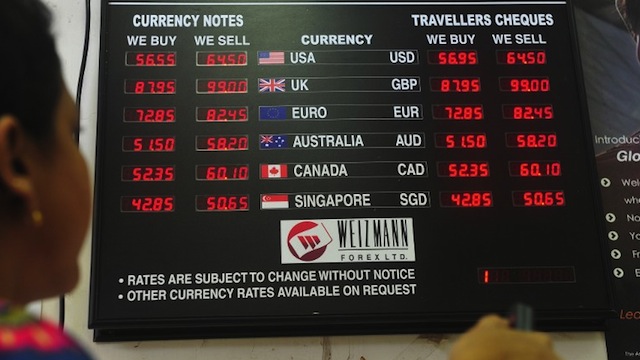SUMMARY
This is AI generated summarization, which may have errors. For context, always refer to the full article.

PARIS, France – Emerging markets have helped rake in a corporate earnings bonanza in recent years, but a sudden plunge in their currencies in mid-2013 due to an expected cut in US stimulus has sorely hit sales and profit.
Quarterly results at companies from Coca-Cola to IBM, Unilever to Casino and luxury group LVMH show that currency volatility has hit the bottom line.
“The ’emerging risk’ is a source of concern in the first release of third quarter results,” economists at broker Aurel BGC said.
The Brazilian real, South African rand, Turkish lira, Indian rupee and Indonesian rupiah lost up to a fifth of their value in August as investors pulled out funds in anticipation the US Federal Reserve would soon begin to taper the amount of monetary stimulus it injects into the economy.
“Across the range of firms missing revenue targets for the third quarter, one factor increasingly blamed is the impact of a higher euro,” said CMC Markets trader Toby Morris.
“…Firms with an active client base in emerging economies are hit the hardest, with weaker currencies magnified in South America and India,” he added in a note to clients.
The euro has not only risen sharply against emerging market currencies, it has also reached its highest levels since 2011 against the dollar due to disappointing economic data from the United States and the prospect of more monetary stimulus.
French electrical equipment group Schneider Electric warned the euro was over-valued and was hurting business.
“It’s painfully evident that the eurozone is the only major economic zone that doesn’t use its currency as an economic weapon and a weapon of competitiveness,” Finance Director Emmanuel Babeau told AFP.
The Paris-based company, a world leader in electrical engineering said that currencies had depreciated sharply in markets where the company can make as much as a billion euros in sales.
“We find ourselves overvalued in relation to many currencies, including the dollar, that’s very clear,” he said.
Accordingly, the company said that organic sales growth would be stagnant instead of the moderate increase it had expected earlier.
Carmaker Renault had a similar story as sales fell 3.2%, even though registration of its vehicles increased by the same amount during the quarter.
“The depreciation of several emerging market currencies (Brazilian real, Russian ruble, Indian rupee, Argentinian peso) had an impact of 5.7 percentage points,” or 439 million euros, on sales, said Sales and Marketing Director Jerome Stoll.
French supermarket group Casino, which has major operations in Brazil, said exchange rates had a negative 16.5 percentage point impact on overall sales in the period. Organic sales growth of 12.5% ended up as a 5.2% decline in sales in reported terms, the company said.
Even US companies have been affected.
At Coca-Cola, volumes increased by 3% but net revenue declined by 3%. Stripping out currency effects revenue would have increased by 4% in the quarter.
Coca-Cola chief executive Muhtar Kent described the results as solid given “an ongoing challenged macroeconomic environment driven by increasing volatility across emerging markets.”
‘Temporary rebounds in volatility’ expected
Analysts expect the businesses to continue to suffer from negative currency effects in the coming quarters.
“We’re starting to see the impact but it will become much more visible in the coming quarters if there isn’t a reversal to the trend” on emerging market currencies, said Romain Boscher, global head of equities at Amundi Asset Management.
In the coming months, companies “will really need to hedge their positions” against the risk exchange rate volatility, warned Sanjay Mathur, a chief economist at Royal Bank of Scotland.
Volatility risks returning when the Fed actually begins to reduce its monthly stimulus from $80 billion, which many now see happening in early 2014.
Anticipation that the Fed begin reducing its stimulus in September had caused the August movements, but in the end the US central bank confounded market expectations.
The crisis over the US budget and debt ceiling, which ended with a temporary deal to keep the government operating, has led numerous analysts to believe the Fed will hold off taking any steps until the political battle is over.
“The spike in stress of this summer” is unlikely to be repeated, but “temporary rebounds in volatility” are to be expected, said Jean Medecin, of the Carmignac Gestion asset management fund.
“Given the current uncertainties over emerging markets and the risk of volatility to results,” economists at Aurel expect companies the most exposed to emerging markets to underperform the European Eurostoxx 50 index of main shares. – Rappler.com
Add a comment
How does this make you feel?
There are no comments yet. Add your comment to start the conversation.